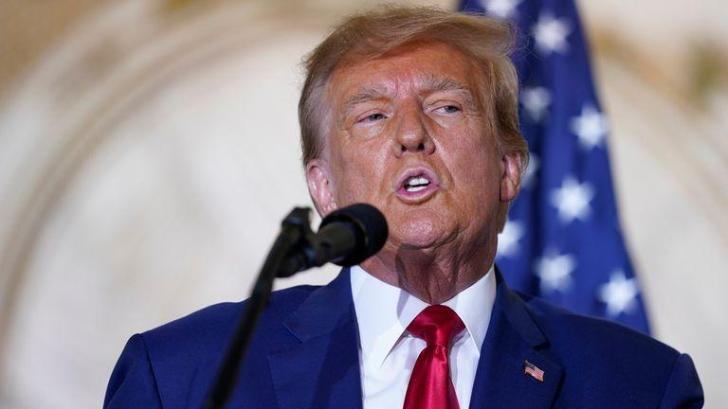News / National
Afrikaners reject Trump's US refuge offer
08 Feb 2025 at 19:14hrs |
0 Views

Afrikaner interest group AfriForum and trade union Solidarity have publicly rejected US President Donald Trump's offer to prioritize white Afrikaners as refugees in the United States, declaring their future lies in South Africa.
During a joint media briefing on Saturday, the organizations emphasized that Afrikaners were "going nowhere," despite Trump's recent executive order aimed at assisting Afrikaners in response to what he called discriminatory policies in South Africa. The order also included a controversial decision to cut US financial assistance for HIV programs in South Africa through USAID.
AfriForum described the executive order as a direct consequence of the South African government's "irresponsible actions and policies," such as the newly signed Land Expropriation Act. While expressing gratitude for the international recognition of the challenges faced by Afrikaners, the organization stated it was committed to solving these issues locally.
AfriForum CEO Kallie Kriel stressed the importance of preserving Afrikaner cultural identity within South Africa. "Emigration only offers an opportunity for Afrikaners who are willing to risk potentially sacrificing their descendants' cultural identity as Afrikaners. The price for that is simply too high. We owe it to our forefathers to protect our existence as Afrikaners here," Kriel said.
He added that AfriForum and Solidarity would focus on practical measures to address injustices faced by Afrikaners while fostering mutual respect with other communities in the country. "Suggestions will also be made on how Afrikaners can contribute positively to tackling the crises that other cultural communities and the country as a whole are currently experiencing," he said.
Solidarity Movement Chairman Flip Buys reiterated the commitment to finding solutions within South Africa, stating that the organization plans to engage President Cyril Ramaphosa and US authorities to seek mutually beneficial outcomes. "We reaffirm today our commitment to the country and all its people," Buys said.
Buys also took the opportunity to dispel rumors that AfriForum or Solidarity had called for sanctions against South Africa or the cutting of funds for vulnerable groups. He blamed the Trump administration's executive order on the ANC government's policies rather than any lobbying by his organization.
AfriForum suggested these proposals could be refined following planned discussions with the South African and American governments.
Meanwhile, South Africa's Minister of International Relations, Ronald Lamola, criticized Washington for spreading misinformation, calling Trump's actions "misguided." President Cyril Ramaphosa announced plans to send delegations to global capitals to clarify the country's policies and defend its position.
This development highlights the growing tension between South Africa's government and advocacy groups, as well as international actors weighing in on domestic issues. Despite external offers of support, AfriForum and Solidarity have made it clear their fight for Afrikaner rights will remain rooted on South African soil.
During a joint media briefing on Saturday, the organizations emphasized that Afrikaners were "going nowhere," despite Trump's recent executive order aimed at assisting Afrikaners in response to what he called discriminatory policies in South Africa. The order also included a controversial decision to cut US financial assistance for HIV programs in South Africa through USAID.
AfriForum described the executive order as a direct consequence of the South African government's "irresponsible actions and policies," such as the newly signed Land Expropriation Act. While expressing gratitude for the international recognition of the challenges faced by Afrikaners, the organization stated it was committed to solving these issues locally.
AfriForum CEO Kallie Kriel stressed the importance of preserving Afrikaner cultural identity within South Africa. "Emigration only offers an opportunity for Afrikaners who are willing to risk potentially sacrificing their descendants' cultural identity as Afrikaners. The price for that is simply too high. We owe it to our forefathers to protect our existence as Afrikaners here," Kriel said.
He added that AfriForum and Solidarity would focus on practical measures to address injustices faced by Afrikaners while fostering mutual respect with other communities in the country. "Suggestions will also be made on how Afrikaners can contribute positively to tackling the crises that other cultural communities and the country as a whole are currently experiencing," he said.
Buys also took the opportunity to dispel rumors that AfriForum or Solidarity had called for sanctions against South Africa or the cutting of funds for vulnerable groups. He blamed the Trump administration's executive order on the ANC government's policies rather than any lobbying by his organization.
AfriForum suggested these proposals could be refined following planned discussions with the South African and American governments.
Meanwhile, South Africa's Minister of International Relations, Ronald Lamola, criticized Washington for spreading misinformation, calling Trump's actions "misguided." President Cyril Ramaphosa announced plans to send delegations to global capitals to clarify the country's policies and defend its position.
This development highlights the growing tension between South Africa's government and advocacy groups, as well as international actors weighing in on domestic issues. Despite external offers of support, AfriForum and Solidarity have made it clear their fight for Afrikaner rights will remain rooted on South African soil.
Source - iol
Join the discussion
Loading comments…









































